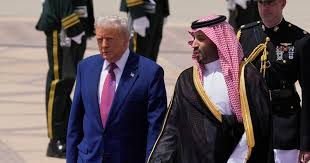Saudi Defence Minister warned Iran to accept Trump nuclear deal to avoid Israeli strike: Report

In a significant development signaling shifting dynamics in Middle Eastern diplomacy, Saudi Arabia’s Defence Minister, Prince Khalid bin Salman, has reportedly delivered a pointed warning to Iran during a rare high-level visit. According to credible sources, Prince Khalid urged Tehran to accept the nuclear deal framework proposed during the Trump administration or risk facing a potential Israeli military strike on its nuclear facilities.
A Rare Diplomatic Visit Amid Rising Regional Tensions
This visit, taking place in April 2025, marked the first time in over two decades that a senior Saudi royal had traveled to Tehran for direct talks with Iranian officials. The meeting was held behind closed doors at the presidential compound, highlighting the sensitivity and urgency of the discussions. The context of this diplomatic engagement is a Middle East fraught with escalating tensions, marked by the ongoing conflicts in Gaza and Lebanon, and the increasing anxiety surrounding Iran’s nuclear ambitions.
Saudi Arabia, long wary of Iran’s regional influence and nuclear program, appears to be taking a proactive approach to prevent any further destabilization. Prince Khalid’s message was clear: Iran must seize the opportunity to accept the terms laid out in the Trump-era nuclear deal before the window closes.
The Trump Nuclear Deal: An Opportunity or a Risk?
The nuclear deal proposed by the Trump administration sought to revive the 2015 Joint Comprehensive Plan of Action (JCPOA) with some adjustments aimed at addressing concerns from both sides. Though the original JCPOA faced challenges and was ultimately abandoned by the U.S. in 2018, the Trump deal attempted to re-engage Iran with stricter oversight, limiting uranium enrichment and nuclear activities.
Prince Khalid stressed that this offer was a critical chance for Iran to avoid military conflict and economic hardship. Saudi Arabia, despite its opposition to many of Iran’s regional policies, recognizes that a diplomatic resolution could serve the greater interest of regional stability.
Israeli Concerns and the Threat of Military Action
The warning from Saudi Arabia also carried an implicit message about Israel’s growing impatience and willingness to consider military options against Iran’s nuclear infrastructure. Israel has repeatedly voiced concerns that Iran’s nuclear program poses an existential threat and has maintained a posture of readiness to launch preemptive strikes if diplomacy fails.
According to reports, Saudi Arabia assured Iran that it would not permit any military operations by the U.S. or Israel from its territory, signaling Riyadh’s desire to avoid direct involvement in a conflict. However, the cautionary tone from Prince Khalid implied that Israel might act independently if Iran does not engage seriously with the nuclear deal proposals.
Iran’s Position: Calculated Caution Amid Economic Pressures
Iranian officials, including President Masoud Pezeshkian and Foreign Minister Abbas Araghchi, received the Saudi delegation with interest but also expressed reservations. Tehran’s leadership is under immense economic pressure due to ongoing sanctions and domestic challenges. The prospect of a renewed nuclear deal offers economic relief and international engagement but comes with concerns about sovereignty and the unpredictability of U.S. foreign policy.
The Iranian side reportedly questioned the sustainability of negotiating with Washington, citing past experiences where agreements were abandoned or altered based on changing administrations. Additionally, the issue of uranium enrichment remains a core sticking point, with Iran reluctant to completely curb its nuclear activities.
Regional Implications: Stability at Stake
The Saudi warning to Iran comes at a critical juncture in Middle Eastern geopolitics. The region faces numerous conflicts, including the protracted violence in Gaza and Lebanon, where proxy tensions between Iran-backed groups and Israeli forces persist. Any escalation involving Iran’s nuclear facilities could spark widespread instability, drawing multiple countries into a broader confrontation.
Saudi Arabia’s engagement with Iran reflects a strategic calculation: preventing war through diplomacy even with a longtime adversary may serve the kingdom’s national interests better than endorsing military escalation. Riyadh appears to be positioning itself as a mediator urging restraint while maintaining its strategic alliances.
Global Reactions and the Road Ahead
International observers have welcomed Saudi Arabia’s diplomatic initiative as a positive step toward de-escalation. The involvement of a key regional player in pushing for a nuclear deal could rejuvenate stalled negotiations and encourage Iran to return to the negotiating table.
However, the path forward remains uncertain. The volatile nature of U.S.-Iran relations, shifting regional alliances, and Israel’s hardline stance create a complex backdrop. Many analysts caution that without clear commitments and mutual trust, the risk of military conflict remains high.
The upcoming weeks are expected to be crucial. If Iran agrees to engage constructively on the nuclear deal, it could lead to a thaw in tensions and open the door to broader cooperation on security issues. Conversely, a rejection or delay could embolden Israel to take unilateral action, potentially triggering a regional crisis.
Conclusion: Diplomacy at a Crossroads
Prince Khalid bin Salman’s warning to Iran underscores the fragile balance in the Middle East between diplomacy and military confrontation. Saudi Arabia’s unprecedented visit to Tehran and the stern message to accept the Trump-era nuclear deal represent an urgent attempt to steer the region away from conflict.
For Iran, the decision carries enormous consequences: a chance to ease sanctions and economic hardships or the looming threat of devastating military strikes. For the broader region and the world, the situation serves as a reminder of the delicate and often volatile interplay of diplomacy, power, and security.
As the situation unfolds, the international community will be watching closely, hopeful that dialogue can prevail over destruction, and that a new chapter in Middle Eastern relations might begin with cautious but meaningful steps toward peace.






